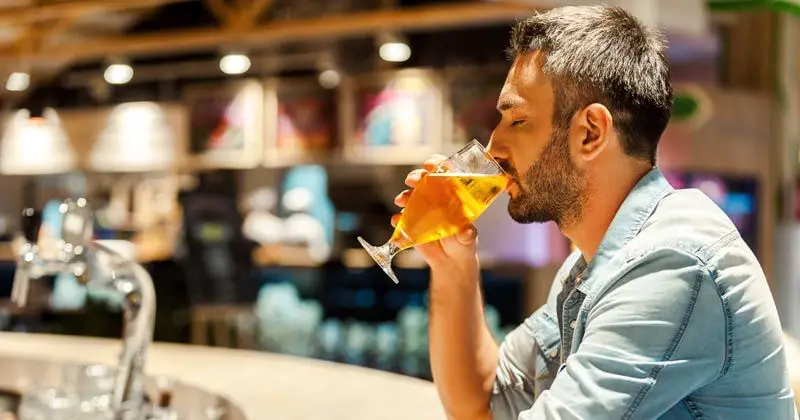Have you ever heard the idea of “liquid courage”? It’s a common phrase that suggests alcohol can give individuals the confidence to do things they might not attempt otherwise. This concept has been around for a while and resonates with many people.
But what precisely is liquid courage, and how does it operate? In this article, we will delve into the origins of this term, its significance, and its impact on us.
Table of Contents
ToggleThe Idea of Liquid Courage
The concept of “liquid courage” has been around for centuries, with evidence dating back to ancient times. For instance, the ancient Egyptians would crush cut cane and extract the juice through boiling and straining. After letting the liquid settle, they would consume it.
This beverage was referred to as “sekhet ennet” or “strong drink.” The Egyptians attributed magical properties to this concoction, believing it could grant them courage and strength.
The idea of using alcohol to gain courage has also been examined in literature.
In Shakespeare’s play “Macbeth,” the character Lady Macbeth famously states, “Come, you spirits that tend on mortal thoughts, unsex me here, and fill me from the crown to the toe top-full of direst cruelty! Make thick my blood, stop up the access and passage to remorse.”
In this quote, Lady Macbeth is requesting the strength to carry out a heinous act, and she believes that alcohol will provide her with that courage.
What Exactly is Liquid Courage?

But what exactly is “liquid courage”? Essentially, it’s the notion that alcohol can provide individuals with the confidence they may lack in certain situations.
It could range from mustering up the courage to ask someone out on a date to delivering a speech in front of a large audience. But how does this phenomenon occur?
Alcohol has various effects on the brain. It enhances dopamine levels, leading to feelings of pleasure and reduced anxiety. It also impacts the prefrontal cortex, which is responsible for decision-making and impulse control.
When this area is impaired, we may exhibit risk-taking behavior and impulsive actions. Also, alcohol is frequently used as a facilitator encouraging individuals to become more outgoing and chatty. As a result, it can enhance one’s self-assurance in settings.
Many people resort to using alcohol as a way to hide their insecurities and cope with emotions too. Although it may offer a confidence boost relying on alcohol is not a sustainable or healthy approach to building self-esteem.
While alcohol may provide a temporary boost in confidence, it’s essential to remember that it can also impair judgment and result in unwise choices. Moreover, excessive drinking can have detrimental effects on our physical well-being, such as liver damage and an elevated risk of specific cancers.
When Is It Not Right To Use Alcohol To Boost Courage?
While alcohol may temporarily increase confidence, it’s crucial to recognize that it can also impair judgment and result in poor decision-making. Here are situations where relying on alcohol for courage is not appropriate:
1. Having Anxiety
If you struggle with anxiety, relying on alcohol to calm your nerves can worsen the situation in the long term. Alcohol can elevate your heart rate, contributing to heart palpitations and increased activity in your nervous system.
It can trigger panic attacks, which only intensify feelings of anxiety. Additionally, alcohol as a coping mechanism may lead to dependency and even addiction.
2. Social Fears
If you have social anxiety disorder, relying on alcohol as a coping mechanism may seem tempting. However, using alcohol to alleviate social anxiety can ultimately result in dependence and worsen anxiety over time.
Many individuals initially turn to alcohol as a way to address their social fears because they hold positive expectations that it will provide relief.
3. Decision-Making
When faced with important decisions, it is crucial to have a clear mind and avoid the influence of alcohol. Consuming alcohol impairs our judgment and decision-making abilities. Therefore, it is advisable to approach significant choices without the interference of alcohol.
4. Driving
When you’re behind the wheel, it’s important to remember that drinking and driving are not only against the law but also puts yourself and others at grave risk. Alcohol significantly impairs our ability to react promptly and make sound judgments, increasing the likelihood of accidents with potentially fatal consequences.
5. Seeking Personal Growth
True self-acceptance and strength come from within, not from relying on alcohol as a temporary mask of confidence. Seeking personal growth and cultivating genuine confidence requires looking inward rather than using alcohol as a crutch.
6. Operating Machinery
When operating machinery, it is illegal and risky to consume alcohol. Alcohol impairs coordination, reaction time, and judgment, thereby jeopardizing not only your safety but also the safety of others around you.
Instead of Liquid Courage
There are various ways to boost your confidence in difficult situations. If you’re struggling to come up with ideas, here’s a list of alternatives you can try instead of relying on alcohol for courage.
Practice Mindfulness
Try incorporating mindfulness into your routine. This powerful technique allows you to stay fully present and focused in the moment, reducing anxiety and increasing self-awareness. Give mindfulness meditation or deep breathing exercises a try to help calm your nerves.
Build self-confidence
Building self-confidence requires dedication and patience, but it is reliable for increasing your courage. Start by setting achievable goals for yourself and taking the time to acknowledge and celebrate your accomplishments. Surrounding yourself with positive individuals who provide support and encouragement can also help in this journey.
Try exposure therapy
Exposure therapy is a technique used to help individuals address their fears in a controlled setting. It entails gradually facing the things that trigger anxiety while receiving support from a therapist. This process can reduce sensitivity to fears and enhance self-confidence.
Conclusion
To sum up, the notion of “liquid courage” has been present for centuries, suggesting that alcohol can provide individuals with the confidence they may lack otherwise.
While alcohol might indeed boost our self-assurance, it is crucial to acknowledge that it can also impair our judgment and lead to unwise choices. As with anything in life, moderation is essential.
Therefore, when considering indulging in a drink for a touch of “liquid courage,” always remember to drink responsibly.

I am a passionate beer connoisseur with a deep appreciation for the art and science of brewing. With years of experience tasting and evaluating various beers, I love to share my opinions and insights with others and I am always eager to engage in lively discussions about my favorite beverage.
















